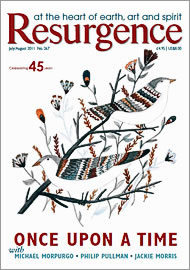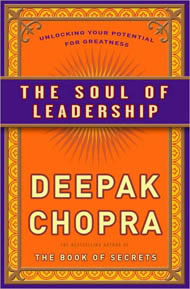With their rich blend of Eastern insight and Western pragmatism, Deepak Chopra’s books have nourished many readers for several decades now, so it was with great anticipation that I first opened the cover of a book on leadership by this globally respected author.
The Soul of Leadership is a small book, packed with insight, which should be read slowly in quiet contemplation. Every page has the potential to inspire, so opening the book at random can be as illuminating as reading the text from beginning to end.
The first important message we are offered – and this I fully endorse – is that becoming a leader is not simply for the few. The author argues that leadership is the most important choice anyone will ever make, describing it as a decision “to step out of the darkness and into the light”. Indeed, he urges us to find our own greatness and act upon it.
A leader, he goes on to explain, is the “symbolic soul” of a group. Thus we can find leadership enacted everywhere, and the leadership that arises from ordinary lives is the leadership that is needed to fill the chronic “leadership vacuum” of modern society. Chopra imagines a world in which “countless leaders can rise to the highest levels of greatness”. For him, this vision is not about the glorification of the few, but is a greatness that enables the potential for greatness to unfold in others.
This is a timely book, published, as Chopra presciently notes, against the backdrop of the mounting struggle by people across the globe to overthrow abusive and dictatorial regimes. Chopra challenges the abusive use of power associated with old definitions of leadership and instead envisions a new form of leadership founded on vision, creativity and a sense of unity. Furthermore, he suggests, “on a planet challenged on every side with ecological deterioration, everything you achieve must be sustainable, which means supported by awareness”.
Awareness is a leitmotif in the book, as is a sense of responsibility for those around us and for our planet. The author reminds us that the ‘old ways’ of living on this planet have reached their limits and insists that true leadership must draw on and from the soul in order to develop the leadership that is required in those around us in our journey.
Chopra describes soul as an underlying universal sense of consciousness: “Your particular awareness, or soul, is like a wave in this boundless sea, unique for a brief moment in time before it falls back into the larger entity from which it emerged.”
Once we have engaged with the notion that we can all enact leadership, we are then presented with practical guidance. This is a road map, however, that is far from the formulaic rhetoric of so many leadership texts. In this book, the acronym ‘LEADERS’ depicts the more important facets of leadership that are often overlooked or misunderstood.
‘ L’ is for look and listen – with your senses, mind, heart and soul. Chopra offers tips for finding what he calls our “soul profile”, which is an odd-sounding phrase, but which focuses on our unique contribution and purpose.
‘E’ is for emotional bonding. Chopra goes beyond describing emotional intelligence to remind us of the need for spiritual intelligence, which he associates with love, compassion, joy and inner peace.
‘A’ is for awareness, a synonym for consciousness. Chopra connects leaders to the infinite and omnipresent, the vast and untapped understanding that falls beyond the thinking mind. For Chopra, leadership is also about evoking this sense of consciousness in a group through centredness, self-motivation, coherence, intuition, creativity, inspiration and transcendence.
‘D’ reminds us that leadership is about doing, and about more reflective and aware decision-making.
‘E’ represents the often overplayed but ill understood word ‘empowerment’. Chopra challenges the assumption that power corrupts: on the contrary, it cannot corrupt so as long as we we move away from ego to focus on transpersonal power.
‘R’ is for responsibility – for our thinking and actions, for others and for society. Responsibility has been much neglected in mainstream leadership texts. Chopra places responsibility at the heart of leadership.
Finally, with ‘S’ Chopra returns to a theme familiar to readers of his previous books: synchronicity. He advises leaders to tune into the power of meaningful coincidence and learn to regard synchronicity as normal.
Chopra says a great deal in a very short book. In it he brings together many of the themes of his previous books, but importantly he applies these ideas to the biggest challenge of our time – the challenge of good leadership.








